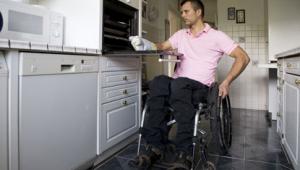While the number of disabled people in work has risen by 930,000 (31%) in the last five years, the number who are out of work has remained “broadly the same” at 3.7 million, according to the NAO.
“Despite the department’s decades of experience supporting disabled people it does not yet know as much as it could about what works in helping disabled people to get and keep jobs,” the NAO said.
The watchdog report said the DWP had “missed opportunities” to assess the impact of cost-effectiveness of its programmes, leaving it with “limited evidence” to support its current efforts.
Amyas Morse, head of the NAO, said: “Given that it has been supporting people to work for a long time, it is not beyond reason to expect the department to know ‘what works’ by now and it is disappointing that it does not.
“It has yet to make a significant dent in the number of disabled people who are out of work, some of whom say they would like to work given the right support.”
The government has set a target of increasing the number of disabled people in employment by one million between 2017 and 2027, but the NAO said this target cannot be linked to any specific policy or programme and therefore the government cannot be held to account on it.
The government estimates that a 1% fall in the incapacity benefits caseload would save £240m a year. As of May 2018, there were 2.4 million people claiming out-of-work incapacity benefits, or the equivalent under universal credit, the report said.
Meg Hillier, chair of the Public Accounts Committee, said: “Work is the route out of poverty which is denied to too many disabled people. DWP needs to get its act together, set out a plan for what it is going to do, and establish a proper target.”
A separate study from the Demos think-tank this week found a “chronic lack of trust” between disabled people and the DWP.
Demos found that 60% of disabled people do not believe the DWP understand their concerns, with only 19% trusting Jobcentre staff to treat them fairly.
The report called for “radical institutional reform” with responsibilities for welfare programmes for ill and disabled people being devolved to NHS trusts and local authorities.
A Demos survey, of 2,000 UK adults, found that 39% of people believe Jobcentres should be run by councils versus 25% by the DWP.
A DWP spokesperson said: “We are reviewing our goal to see one million more disabled people in work by 2027, and we are working with a wide range of organisations to ensure disabled people receive the best possible employment support.”
The £386m was spent on employment support, through coaching and training, in 2017-18, the NAO noted. In the same year the department spent £15bn on working-age incapacity benefits.











